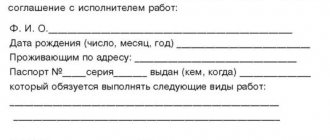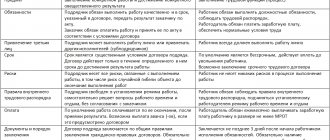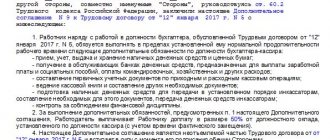Essential terms of the employment contract
According to Art. 57 of the Labor Code of the Russian Federation, the mandatory conditions of an employment contract are:
- Place of work. The text of the agreement must indicate the full name and location of the organization to which the employee is accepted. If the structural divisions of the enterprise are located in different localities and administrative regions, then when agreeing on the terms of concluding an employment contract, the place of work is specified in relation to these structural divisions. A change of place of work is possible only by mutual agreement of the parties.
- Labor function is a type of activity in accordance with qualifications for a certain profession (position) that an employee is required to perform. It is necessary to indicate in the text of the employment contract a mandatory condition regarding the type of work, as well as the fact that it remains unchanged for the entire duration of work. The employer does not have the right to require the employee to perform a function not specified in the contract. Changing the mandatory terms of an employment contract is permitted only by agreement of the parties.
- Work start date (and end date). The start time of work is an essential condition of the employment contract; it is important, since from this moment the employee is subject to wage legislation. Typically, the start of work immediately follows the signing of the relevant agreement. However, the parties can agree on some delay of this moment.
- Conditions of remuneration (including the size of the tariff rate or official salary of the employee, additional payments, allowances and incentive payments). In an employment contract, the condition on remuneration should also be considered as essential, and if the parties do not reach an agreement on it, the contract cannot be considered concluded. In accordance with Article 129 of the Labor Code of the Russian Federation, when paying workers, tariff rates, salaries, as well as a non-tariff system can be used, if the organization considers such a system the most appropriate.
- Term. If the agreement is concluded for a certain period (fixed-term employment contract), then in accordance with Part 2 of Art. 57 of the Labor Code of the Russian Federation, it is necessary to indicate the period of its validity, as well as the circumstances that led to its conclusion. According to Art. 59 of the Labor Code of the Russian Federation, fixed-term contracts can be concluded: for the duration of the duties of an absent employee; for the period of temporary work (up to 2 months); for seasonal work, etc. The maximum period for concluding a fixed-term employment contract is five (Part 2 of Article 58 of the Labor Code of the Russian Federation).
In addition, it is necessary to indicate in the employment contract a mandatory condition that it is concluded for the duration of seasonal work, or is fixed-term, or part-time.
https://youtu.be/aQ_v-F7QkVI
What conditions are mandatory?
The mandatory conditions of an employment contract, as mentioned, are given in Article 57 of the Labor Code of the Russian Federation.
Labor Code of the Russian Federation
These include:
- place of work , which in some cases is specified by additional data in the form of the name of a department or branch;
- labor function , which must be indicated taking into account the standards of the qualification directory of positions and the staffing table of the enterprise with job responsibilities or a reference to local acts, for example, to a job description;
- duration of the contract , that is, whether the contract is indefinite, or cooperation is limited to a certain period, indicating the reasons that served as the basis for establishing such a limitation on the validity period (for example, part-time work);
- start date of work , however, if the contract does not specify the date of the first working day, the contract is considered to have entered into force from the moment it is signed, and the employee must begin performing his duties on the next day (Article 61 of the Labor Code of the Russian Federation);
- the amount of payment with a full list of all due payments in the form of salary or tariff rate, as well as additional allowances for certain working conditions and indicating incentive payments, if such payments are established in local regulations;
- work and rest schedule , if such conditions differ from those established at the enterprise for other employees, or with reference to the Internal Labor Regulations;
- working conditions , involving the presence of harmful factors or irregular work, which implies not only some responsibilities, but also guarantees established at the legislative level;
- the nature of the work , that is, whether it will be mobile or traveling, which implies certain requirements for the performance of duties, as well as the payment procedure;
- the presence of conditions for the provision of social benefits , for example, in the event of illness, disability, pregnancy or an accident at the enterprise, as well as in a number of other situations.
You can download standard employment contract forms here:
Standard form of a fixed-term employment contract
Part-time worker's employment contract
Indefinite employment contract with probationary period
Indefinite employment contract without probationary period
Parties
The parties to the contract are the enterprise and the hired employee.
Since the entire institution, for a number of reasons, cannot be a representative party, an agreement is concluded between a person authorized to represent the interests of the enterprise, for example, a director and a future employee.
That is, the employment contract states that the contract is concluded between, say, I.P. Safronov, represented by the director, who is hereinafter referred to as the employer, and directly the employee.
Working conditions
If there are specific features of the enterprise’s activities, the employment contract must stipulate working conditions in the workplace.
That is, if at the place where the labor function is performed there are harmful labor factors, which are determined in accordance with the certification of workplaces, or irregular work is expected.
In particular, the stress and severity of work, the microclimate in the workplace, pollution or vibration, which are assigned a hazard code of at least 3.2 (based on the Guidelines for the Hygienic Assessment of Working Environment Factors No. R. 2.2.2006-05), or the employee’s occupation are considered harmful factors involves occasional involvement in the performance of official duties during non-working hours.
Place of work
One of the main terms of the contract is to indicate the place of work, but Article 57 of the Labor Code of the Russian Federation does not consider this nuance in detail, so the name of the enterprise and legal address are often indicated, which may not correspond to the actual location of the employee.
In the future, such an omission may result in significant problems.
Thus, on the basis of Article 72.1 of the Labor Code of the Russian Federation, an employee can be transferred without consent to another place or department, provided that this does not entail changes in the terms of the contract.
In practice, the absence of an exact place of work may entail a violation of the rights of an employee, who may be transferred to another department, theoretically to a similar position with a similar job function, but in fact with different responsibilities.
That is why the location of the workplace must be clearly defined and specified in the employment contract.
How to formalize a change in the terms of an employment contract at the initiative of the employer? Read about it on our website. What to do if the employment contract is drawn up with violations? Find out here.
Employee rights
The basic rights and obligations of an employee are enshrined in Article 21 of the Labor Code of the Russian Federation, and it is the agreed conditions that form the basis of the cooperation agreement.
Thus, it stipulates the following conditions:
- the right to formalize labor cooperation in accordance with the law;
- the right to perform duties only within the limits of the job description and the concluded contract;
- the right to a place of work that meets all safety criteria;
- the right to wages in the prescribed amount;
- the right to rest, in accordance with the norms established by law;
- the right to receive information about all working conditions, in particular about the presence of harmful factors;
- the right to receive compensation in the manner and amount established by law;
- the right to protect your rights in any way established by law.
In addition to rights, the employee also has responsibilities.
The employee is obliged:
- accurately fulfill the duties assigned to him by the contract and job description;
- comply with the operating hours established at the enterprise, as well as follow labor protection requirements;
- treat with care the property or means of protection that are provided to him to perform his official duties.
Employer Responsibilities
But not only employees have rights and responsibilities - in Article 22 of the Labor Code of the Russian Federation, similar concepts are assigned to management.
In particular, the manager is obliged:
- comply with labor law and other regulations;
- provide the employee with a place of work in accordance with the terms of the contract, with the issuance of the necessary tools or equipment for the performance of duties that meets labor protection requirements;
- ensure payment of wages in the agreed amount and on time;
- ensure the provision of social guarantees and compensations established by federal legislation or local regulations.
The employer has the right:
- conclude labor cooperation agreements;
- require employees to perform specified duties;
- reward and encourage employees based on their performance;
- apply disciplinary action;
- adopt local acts.
In what cases is a temporary employment contract concluded? Find out from our article. Are you looking for a part-time employment contract? You will find the document form in this material.
How is an employment contract between an entrepreneur and an employee drawn up? See here.
Salary
A special place is occupied by the section on wages, which is regulated by the norms of Article 136 of the Labor Code of the Russian Federation, defining the following components:
- payment period;
- place of receipt of wages;
- amount of payments;
- conditions.
An approximate list of salaries is presented in the table:
| No. | View | Conditions | Reasons |
| 1. | Mandatory payments: | ||
| 1.1 | Salary | Time sheet | Article 135 of the Labor Code of the Russian Federation |
| 1.2 | Tariff rate | Time sheet | Article 135 of the Labor Code of the Russian Federation |
| 2. | Compensation payments (paid only under certain working conditions): | ||
| 2.1 | Surcharge |
|
|
| 2.2 | Surcharge |
|
|
| 3. | Incentive payments (based on the financial capabilities of the enterprise): | ||
| 3.1 | Prize | Conditions of the provision | Regulations on bonuses |
| 3.2 | Bonuses | Section: Remuneration | Terms of the employment contract |
Work schedule and working hours
The condition on the working hours is another mandatory component of the contract, especially if the enterprise employs a large staff of workers with different work schedules or part-time workers.
When hiring employees with a flexible or shift work schedule, the employment regime must be clearly defined in the employment contract, indicating a reference to the shift schedule and time sheet.
An individual work schedule must be determined for part-time workers, especially if their working hours differ from the regime adopted for the entire enterprise.
Time relax
The condition of the employee’s rest is no less important than working hours, given that types of rest are regulated by law, and employers are also given the right to increase some of these periods at their discretion at their own expense.
In particular, Article 108 of the Labor Code of the Russian Federation states that the lunch break should be at least half an hour, but the enterprise can also set it for a longer duration (maximum - up to two hours).
In accordance with Article 115 of the Labor Code of the Russian Federation. The duration of the next paid vacation is 28 calendar days, but the employer may, at its discretion, provide for a longer duration of this type of vacation.
According to Article 117 of the Labor Code of the Russian Federation, an enterprise is obliged to provide employees with additional leave in the presence of harmful factors in the workplace for at least 7 days, but again no one prohibits extending such leave.
Additional rest is also provided to other categories of employees who work in special conditions, and employers also have the right, based on their own capabilities, to provide regular or additional leave of longer duration.
Occupational Safety and Health
In accordance with Article 212 of the Labor Code of the Russian Federation, the obligation to ensure safe work is assigned to the employer, but, nevertheless, this fact does not cancel the employee’s obligation to comply with established requirements at his workplace.
Such requirements include the following:
- An employee can be suspended from work if he has not undergone training and verification of labor safety rules (Article 76 of the Labor Code of the Russian Federation).
- You can bring an employee to disciplinary liability if the violations resulted in damage to the property of the enterprise (Article 192 of the Labor Code of the Russian Federation).
- An employee can be fired if his actions in violation of labor protection lead to serious consequences (Article 81 of the Labor Code of the Russian Federation).
Guarantees and compensation
In accordance with current legislation, the employee already has some types of guarantees and compensation, which include:
- maintaining a job during periods of incapacity for work or while on vacation;
- benefits during pregnancy, combining work and study;
- provision of compensation payments in case of an accident at an enterprise and a number of other benefits and payments established by law.
Regardless of whether the mentioned conditions are stipulated in the contract, they must be fulfilled by the employer.
But the employer has the right to include in the contract a list of benefits and compensation that will be provided at the expense of the enterprise - for example, free food or delivery to the workplace, payment for mobile communications within the company, or the provision of departmental housing on preferential terms.
In what cases is it possible to terminate an employment contract at the initiative of the employer? Read our article. How long can an employment contract last? Find out here.
Responsibility of the parties
In addition to other conditions, the employment contract must provide for the liability of the parties in the event that the terms of the contract are violated or the rights of one of the parties are infringed.
For example, the conditions of financial liability may be stipulated for causing damage to the property of an enterprise, or to the property of an employee who, under the terms of the contract, uses personal property to perform official duties (Article 188 of the Labor Code of the Russian Federation).
Also, on the basis of Article 232 of the Labor Code of the Russian Federation, the amount of compensation for both the manager and the employee must be equivalent to the damage caused, and not to the status held, which is a violation of the law.
Termination of employment relationship
One of the components of labor cooperation is the conditions for its termination, that is, dismissal.
Both management and the employee have the right to terminate the contract. Article 77 of the Labor Code of the Russian Federation provides an almost exhaustive list of grounds for dismissal, both at the initiative of the enterprise and at the initiative of the employee.
Depending on the specifics of the enterprise and personnel policy, among others, the conditions for termination of employment relationships stipulate:
- procedure for dismissing a part-time worker;
- the procedure for dismissal in case of unsatisfactory results under the terms of the employment test;
- the procedure for terminating fixed-term contracts if the employee works under a contract with a limited duration;
- the procedure for terminating the contract if there is a student contract that has not expired;
- a number of other conditions that are essential specifically when concluding an employment relationship with a certain employee.
Let’s say that when a coach or athlete is dismissed, there is a separate procedure for dismissal, specified in Article 348.12 of the Labor Code of the Russian Federation, which provides for separate conditions for dismissal.
In particular, the mentioned article says that if an agreement has been drawn up with a coach for a period of more than 4 months, then in a number of cases, the employee does not have the right to resign on his own initiative without good reason, which is not established at the legislative level and is present mainly in the comments to the Labor Code of the Russian Federation.
It is in the employment contract that it is possible to provide a list of valid reasons for dismissal, which can be applied both in the event of dismissal of an employee and in the presence of an apprenticeship contract (Article 249 of the Labor Code of the Russian Federation), the procedure for dismissal of which is in many ways similar to the dismissal of a coach.
Additional terms of the employment contract
Optional provisions (Article 57 of the Labor Code of the Russian Federation):
- Employee's probationary period - the employer has the right to stipulate in the employment contract additional conditions of the probationary period and its expiration date.
- Non-disclosure of secrets protected by law - the employer may require the employee to sign a non-disclosure of commercial, official and other secrets.
- Types and conditions of additional insurance for the employee - the employer may stipulate in the terms of the employment contract the obligation to provide any additional insurance to the employee.
- Improving the social and living conditions of the employee and his family members.
- The employee’s obligation to work after training for at least the established period if the training was carried out at the expense of the employer. There are often cases when an employer, wanting to protect its investment in personnel training, obliges the employee to work for a certain period after training.
- Other additional terms of the employment contract: on increasing leave, monetary compensation and other conditions that do not worsen the employee’s position in comparison with the Labor Code of the Russian Federation, laws and other regulatory legal acts (Article 57 of the Labor Code of the Russian Federation).
What types of contract terms are there?
There are several types of employment contract terms that are used in legal practice. Labor law provisions provide for the following classification of requirements:
- by importance of provisions (mandatory, optional);
- by type of working legal relationship (in relation to fixed-term contracts and open-ended contracts);
- by category of employees (general, individual).
Labor legislation guarantees the right of employers to create individual contract forms based on the intricacies of the work process and the requirements of the functional responsibilities of specific positions.
Essential
Table No. 1 “Mandatory conditions that are displayed in the content of the employment contract”
| General provisions | Specific Requirements |
| Place of work | The name and legal address of the enterprise within which the candidate will serve. Additionally, the need for transfer between branches of the organization is indicated if this is provided for by production needs. |
| Job responsibilities | All types of positions are divided into two categories based on the presence of harmful or dangerous working conditions. If there are none, then the director can independently come up with job titles. If there are any, the name is indicated only on the basis of fixed standards. |
| Start date of activity | The day of signing the contract does not always coincide with the beginning of the actual performance of work duties. |
| Salary | The employer prescribes the salary amount, the amount of regular accruals, as well as the possibility of receiving additional bonuses and periodic financial accruals. The law establishes deadlines for transferring funds. |
| Working hours | Work shifts and their duration are recorded. Additionally, rules for performing work duties on weekends and holidays are prescribed. |
Additional
Regulatory acts stipulate the following list of optional circumstances:
- the duration of the employment contract (described in the employment agreement only if the contract is signed for a specific period);
- the amount of compensation upon dismissal if, along with mandatory contributions, the employer guarantees optional payments to its specialists;
- special guarantees provided for employees performing duties in special circumstances (harmful, dangerous);
- requirement to obtain insurance;
- the nature of the activity (this point will be relevant for those categories of production that involve frequent business trips and travel);
- the need to form a probationary period (its duration, as well as grounds for termination);
- financial responsibility of participants.
There is no single list of optional conditions in the legislation. The only requirement is that such aspects should not contradict the norms of labor law.
Random
This category includes clarification of circumstances that are optional, but mandatory to clarify working conditions in connection with the peculiarities of the production process. This group includes:
- requirement to pay a penalty;
- equipping work stations with additional technical equipment;
- provision of a deposit;
- attracting guarantors to work;
- features of termination of temporary work;
- additional insurance of risks associated with work and profit.
All types of conditions are divided into groups and displayed in the agreement in turn, indicating the section number.
Rights and obligations of the employer
There is no single list of rights and obligations that must be observed by the employer. The director of the company can hope to exercise the following rights:
- signing an agreement with desired applicants;
- making amendments to current contracts by agreement of the participants and only within the framework of the law;
- obtaining proper work results from hired employees;
- submitting an initiative to convene a commission for the consideration of collective disputes;
- assessing the professional qualities of employees.
Article 22 of the Labor Code of the Russian Federation establishes the main responsibilities of the employer. These include:
- compliance with legal regulations;
- providing access to job responsibilities;
- guarantee of safety precautions for employees;
- equipping with special equipment necessary for work;
- timely payment of wages;
- social insurance;
- reimbursement of all compensation.
Before starting the activity, the contents of the contract must reflect mutual rights and obligations. Not all aspects may be covered in the agreement. If conflict situations arise, you will have to be guided by the code and the norms of other legal acts.









